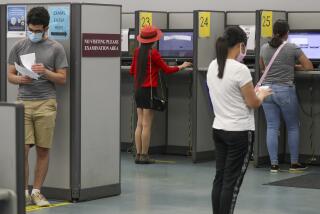Indignities Without Benefit
- Share via
By ordering random drug tests for the nation’s airline pilots, truck drivers and other transportation workers, the U.S. Department of Transportation has done what Congress had declined to do and what most federal courts had forbidden. The program will subject 4 million Americans to the indignities of regular urine tests and will invade their privacy on a massive scale without, we fear, making the highways, the rails or the skies one bit safer.
Transportation Secretary James H. Burnley IV, in announcing the tests, said, “The American people demand and expect a drug-free transportation system.” We share his concern that too many truck drivers and train engineers may be abusing drugs. Drugs clearly contributed to several recent transportation disasters, including the January, 1987, collision between an Amtrak train and a Conrail locomotive that claimed 17 lives; the Conrail engineer who drove his locomotive into the other train’s path had drugs in his system.
But these well-publicized cases do not justify the Transportation Department’s shotgun approach. The department, for example, is requiring the airlines to test not only pilots but also flight attendants, whose connection to safe flying seems remote. A middle-aged railroad employee with an unblemished safety record would be just as likely to be asked for a urine specimen as would a 25-year-old with a tendency toward carelessness. The dignity and morale of millions of respectable, law-abiding workers are jeopardized by the Transportation Department order.
Their constitutional rights also are on the line. The federal courts, in deciding whether drug tests violate the Fourth Amendment’s ban on unreasonable searches and seizures, generally weigh the intrusion on an individual’s privacy against the government’s justification for the tests. Under this standard, random testing of the sort prescribed by the Transportation Department has not fared well --even for police officers, firefighters and railroad workers whose jobs affect public safety. Most, though not all, judges prefer that an employer have some particular reason for suspecting an employee of drug use before subjecting him to a drug test that may cost him his job.
The U.S. Supreme Court has yet to rule on this approach, but early this month it heard arguments in two drug-testing cases. The justices can resolve both cases on narrow grounds and may not reach the issue of random testing. However the court rules, it seems clear to us that the Transportation Department has not sufficiently justified the dragnet that it intends to cast throughout the industry. Drug abusers in the transportation field can be identified by more focused methods--by testing all job applicants and the workers whose behavior suggests drug abuse, by requiring regular physical examinations and by checking everyone involved in an on-the-job accident. These methods have passed constitutional muster and have been accepted by union members.
Random tests, on the other hand, are not only invasive but also expensive (testing will cost the transportation industry more than $2 billion a year) and subject to error. False-positive results are common, some laboratories cannot be trusted and even the well-administered tests don’t prove whether someone is a drug abuser whose work is impaired; they indicate only that at some time in the past, as long as a month before the test, the individual ingested drugs.
For just these reasons Congress last month deleted from the Omnibus Drug Act a Senate approved provision that would have mandated random testing throughout the transportation industry. The Transportation Department, in our view, should have deferred to the congressional wishes and forgotten about random tests.
More to Read
Sign up for Essential California
The most important California stories and recommendations in your inbox every morning.
You may occasionally receive promotional content from the Los Angeles Times.










